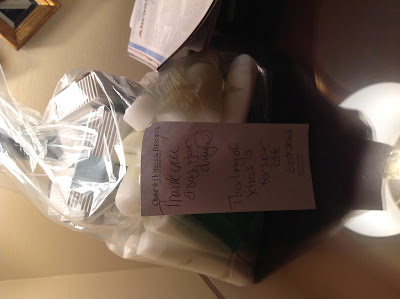 |
| My get-to-sleep kit: a book, hypnotherapy tape, and med |
Last spring a doctor prescribed a sleep routine to treat my chronic insomnia: low light for an hour before bed, no TV, no computer, no reading in bed. I take a sleep med fifteen minutes before bed and then listen to a hypnotherapy tape. I creep up to bed in the dark and try not to wake up Jerry.
It's helped, but I still struggle to get to sleep.
This week I stopped taking a sleep med that could be habit-forming and switched to a more benign one. Coincidentally, I also heard a lot of sad news about friends and neighbors, including the bad news that Bill, the beloved Food Pantry director, had a mild heart attack and has been hospitalized. My sleep got even more ragged.
I think I could make a good case for people suffering insomnia. Why not? Shit happens. Things go wrong. As you get older, more things go wrong. And your sleep gets worse, possibly because, like me, you're busy cataloguing what's gone wrong and, even scarier, what could go wrong. Of course, none of this worry actually helps. I know that.
But even Jerry, the scientist who approaches life with logic, has insomnia, the kind where he wakes up in the middle of the night and can't get back to sleep. He worries about research papers he's writing, what the weather's going to be like on a field trip, and family problems.
I read an article in last week's Sunday New York Times about sleep ("Rethinking Sleep"), in which the author, David K. Randall, proposes that we let go of the idea of eight consecutive hours of sleep and have shorter periods of sleep, instead. He reports that a researcher has found that people who wake up a little after midnight in an experiment that encouraged them to accept the idea of split sleep actually enjoyed a couple of hours in the middle of the night as "a chance for deep thinking of all kinds, whether in the form of self-reflection, getting a jump on the next day, or amorous activity."
Enjoy? I'm never asleep before midnight because I'm busy running through a list of worries. The most successful I've been at getting to sleep is imagining all food for thought, pleasant or unpleasant, locked up in a very sturdy file cabinet, removed and inaccessible. Then I sleep. The longer I have away from those worries, the better.
I might get an actual metal box, write my worries on slips of paper, and lock them up in it. That's the next thing I'm going to try.





















































